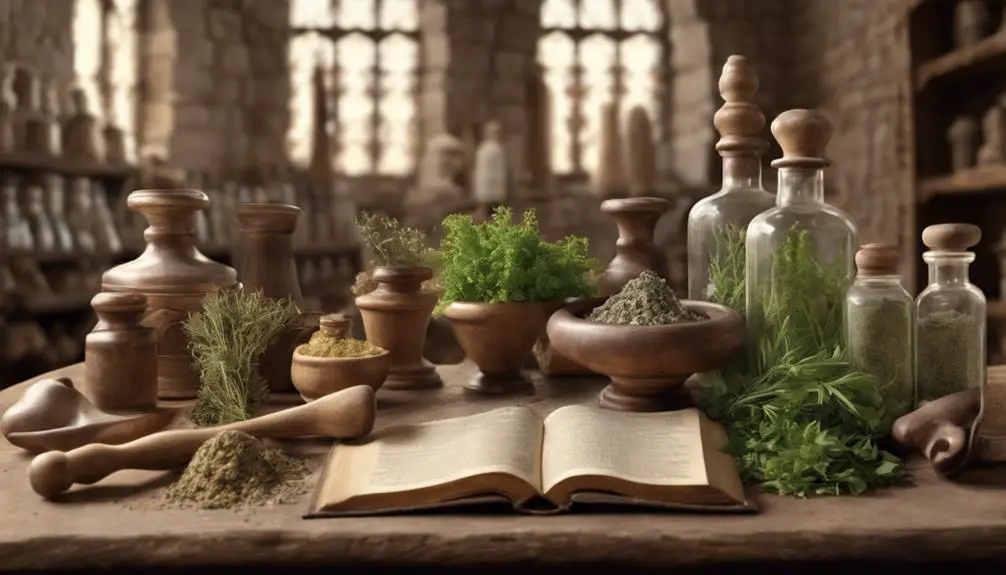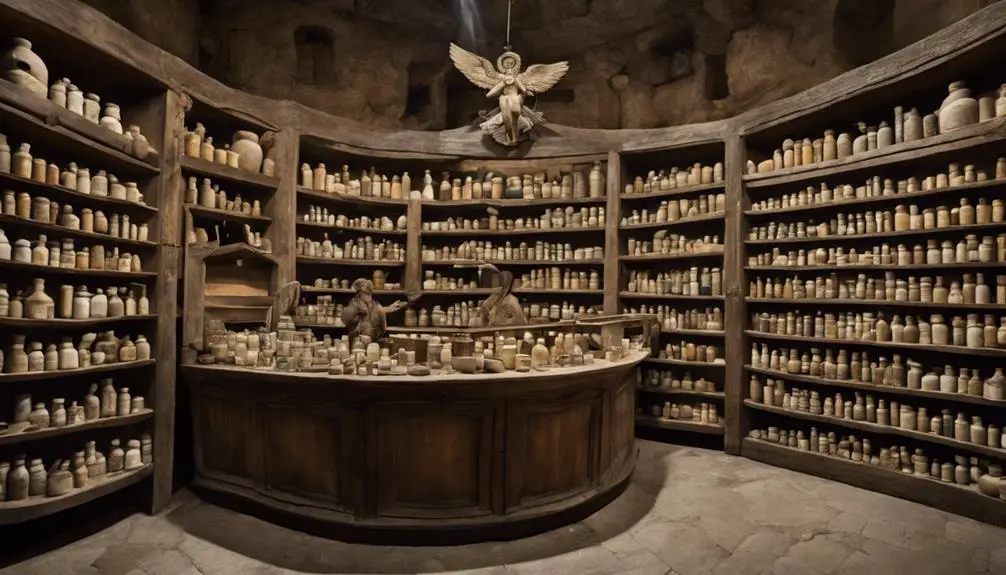Analyze the intriguing role of apothecaries in biblical times and their timeless significance in our world today.

Apothecary in the Bible
Like an apothecary delicately crafting a healing balm, the Bible mentions these ancient pharmacists in a way that's both intriguing and enlightening. You'll find them nestled within the pages, their roles subtly highlighted in the tales of healing and restoration.
They're often overlooked, yet their contributions to society and biblical narratives are as vital as the rarest of herbs in a healing potion. Now, don't you wonder how these apothecaries shaped the world of biblical times and what significance they might hold for us today?
Key Takeaways
- Apothecaries in biblical times specialized in the study and application of medicinal herbs, contributing to physical health and religious practices.
- They held significant spiritual roles, serving as intermediaries between physical and spiritual realms and symbolizing the union of earthly and divine knowledge.
- They played a crucial role in biblical healing, using a blend of natural ingredients and divine intercession, emphasizing holistic health.
- Modern interpretations of biblical apothecaries influence current holistic and natural healing methods, symbolizing restoration and hope in healthcare practices.
Biblical Origins of Apothecaries

Delving into the biblical origins of apothecaries, it's intriguing to note that these ancient practitioners of medicine were mentioned numerous times in the scriptures, underscoring their vital role in society. They were the scholars who studied and understood the properties of medicinal herbs mentioned in the Bible, like the balm of Gilead and mandrake.
You'll find that these ancient prescriptions were largely plant-based, harnessing the healing power of nature. They employed a range of herbs and spices such as hyssop, cumin, and frankincense, demonstrating knowledge that was both comprehensive and advanced for its time.
In the book of Ezekiel, you'll notice a reference to the apothecary's art, highlighting their role in the preparation of anointing oils. In Exodus, they're responsible for creating sacred incense. These examples illuminate not only the practical but also the sacred duties of these early pharmacists.
Analyzing the ancient prescriptions and medicinal herbs in the Bible, it's clear that apothecaries were integral to both the health and spiritual life of their communities. Their knowledge of herbal medicine, as recorded in biblical texts, indicates a rich tradition of healing that has permeated through the centuries.
Role of Apothecaries in Biblical Times

In biblical times, apothecaries played a critical role, not only in maintaining the physical well-being of their communities but also in fulfilling religious obligations. They were the primary dispensers of medicine, utilizing Ancient Prescription Methods that often involved herbs and natural substances. The knowledge required to understand and apply these methods was immense, as was the responsibility that came with it.
Apothecaries' Social Status was significantly elevated due to their vital role. Their expertise in preparing and administering remedies was a valuable asset that earned them respect and influence. The community heavily depended on them for health and wellness. They were the ancient equivalent of modern pharmacists, and their role was integral to both the physical and spiritual health of the society.
However, their job wasn't limited to mere health care. Apothecaries also prepared oils, spices, and other substances for religious ceremonies, making them key figures in the spiritual life of the community. Thus, their role transcended the boundaries of health care and extended into the religious realm, emphasizing their pivotal role in biblical times. Despite their complex and demanding role, apothecaries carried out their duties with diligence, contributing significantly to their communities.
Spiritual Significance of Apothecaries

Beyond their role in healthcare, apothecaries held a profound spiritual significance within their societies. They weren't simply medical practitioners, but were also seen as spiritual intermediaries, a bridge between the physical and spiritual realms. This is where apothecary symbolism comes into play.
The Spiritual Apothecary, in this context, symbolizes a fusion of earthly and divine knowledge. They were perceived as healers who, through their understanding of nature's pharmacopeia, could draw upon divine wisdom to treat both body and soul. Their role was akin to a priest, ministering not only to physical ailments, but also to spiritual maladies.
The tools and substances of an apothecary were seen as sacred and their work was often shrouded in ritual and ceremony, further enhancing their spiritual status. In their hands, the mortar and pestle weren't just tools but sacred symbols, representing the harmonious blend of earthly and divine wisdom.
In essence, the spiritual significance of apothecaries in the Bible lies in their embodiment of the divine healer, a role that transcends the physical and ventures into the realm of the spirit. They were the custodians of healing, both physical and spiritual, a testament to the holistic nature of biblical healing.
Apothecaries and Biblical Healing Practices

Drawing from their profound spiritual significance, apothecaries also played a pivotal role in the practical application of healing practices as outlined in biblical texts. These healers used a blend of natural ingredients and divine intercession, embodying a unique synthesis of the physical and spiritual realms.
Let's delve into the ancient recipes they used. Often, these concoctions were compounded from plants, herbs, oils, and minerals, each carrying a symbolic resonance in addition to its medicinal properties. For instance, the 'Balm of Gilead,' a salve mentioned frequently in the Bible, was an amalgamation of various botanical extracts believed to have healing powers.
Besides these tangible remedies, apothecaries also performed healing rituals. These ceremonies often invoked divine assistance, reinforcing the belief that healing wasn't merely a physical process, but also a spiritual one. One such ritual involved the use of sacred anointing oils, which were applied to the sick person to aid recovery.
In essence, you'll find that biblical apothecaries weren't just pharmacists, but also spiritual practitioners. Their healing practices were a holistic blend of physical treatments and spiritual rituals, offering a glimpse into the complex interrelationships between health, sickness, faith, and divine intervention in ancient times.
Modern Interpretations of Biblical Apothecaries

As we shift our focus to the modern interpretations of biblical apothecaries, it's crucial to understand that their ancient practices have significantly influenced today's holistic and natural healing methods. Biblical pharmacy, for example, has paved the way for the use of natural remedies in modern medicine.
Consider the apothecary symbolism in the Bible. It's a representation of healing and restoration, principles that are still valued in today's medical practices.
To better comprehend these links, let's examine the table below:
Biblical Apothecaries |
Modern Interpretations |
Symbolism |
|---|---|---|
Use of Natural Herbs |
Holistic Medicine |
Harmony with Nature |
Healing Ministry |
Healthcare Profession |
Service to Humanity |
Sacred Vocation |
Pharmaceutical Science |
Dedication and Commitiveness |
Divine Wisdom |
Medical Knowledge |
Pursuit of Understanding |
Restoration of Health |
Therapeutic Practices |
Revival and Renewal |
This table clearly illustrates the continuity and evolution from biblical apothecaries to modern interpretations. It helps us appreciate the depth of the apothecary symbolism and its enduring relevance in the ever-evolving world of medicine. Indeed, the biblical pharmacy was more than just a provider of remedies; it was a symbol of healing and hope.
Frequently Asked Questions
How Did Apothecaries Contribute to the Development of Modern Medicine?
You've asked how apothecaries contributed to modern medicine.
Well, they're responsible for preserving and refining ancient healing techniques. Their meticulous work helped in the evolution of biblical medicine, turning raw ingredients into effective remedies.
This laid the groundwork for today's pharmaceutical science.
Were There Any Notable Apothecaries Mentioned in the Bible?
While there aren't any specific apothecaries mentioned in the Bible, the term 'apothecary' is referenced numerous times, signifying their importance in ancient societies.
The Bible attributes strong ethics to these early healers, showcasing their commitment to care and healing.
Apothecary symbolism in the Bible often represents the blending of spiritual and physical healing, reinforcing the integral role they played in biblical times.
What Were the Common Herbs and Ingredients Used by Apothecaries in Biblical Times?
You're inquiring about the herbs and ingredients prevalent in ancient times, right?
Well, Biblical apothecary techniques often utilized common herbs such as frankincense, myrrh, and balm of Gilead. They also harnessed the properties of olive oil and wine for medicinal purposes.
Ancient herbal preservation was key to their practice, as it ensured the potency and effectiveness of their remedies were maintained over time.
Did Apothecaries in the Bible Have Any Specific Social or Cultural Status?
Yes, biblical apothecaries had a particular social status. They were often seen as scholars due to their extensive 'Apothecary Education'. Their knowledge of plants, herbs, and their medicinal uses was highly respected.
As for their ethical standing, 'Biblical Apothecaries' Ethics' were of utmost importance. They were trusted with the health of their community, making them essential, respected figures.
Their role wasn't just medicinal but also spiritual, often intertwined with religious practices.
How Are the Practices of Biblical Apothecaries Reflected in Today's Pharmaceutical Industry?
You can see reflections of biblical apothecaries in today's pharmaceutical industry through their use of natural ingredients and healing herbs, similar to the Biblical Pharmacopoeia.
The Apothecary Symbolism, with its mortar and pestle, signifies the blending of compounds, an essential part of modern pharmacy.
Conclusion
In understanding the biblical context of apothecaries, you've delved into their origins, roles, spiritual significance, and healing practices.
You've recognized their role as early pharmacists who used nature's bounty to heal.
You've explored their spiritual symbolism, representing God's healing power.
Modern interpretations vary, but the enduring image of the biblical apothecary remains a testament to the divine-human partnership in healing.
Remember, this ancient profession's influence extends into today's healthcare practices.



Sign up